- Home
- Dusty Richards
The Sundown Chaser Page 2
The Sundown Chaser Read online
Page 2
“Fine. I’ll pay you for the feed tonight and ride on.”
“Ease off a little, hoss. You and I have done business before.”
Eyeing the broad-shouldered rancher, Thurman took a deep breath. This would be his last run out of Mexico with stolen horses. He aimed to make it that—his last. Down there, they had an X marked between his shoulder blades for some old Mauser rifle. If Coleman expected to pay anything less, Thurman planned to haul his tired butt out of there in the morning for San Antonio.
“Them boys of yours know the chuck routine here,” said Coleman. “Chelsea’ll feed ’em. Let’s go to the house and find us some whiskey and talk this over.”
Thurman glanced back at the corral. A couple of the ranch hands were forking hay. If Coleman thought whiskey was going to lower his price, he’d better save it for the next sucker.
An hour after supper, they sat on the leather chairs that circled around the native-stone cold fireplace in the open-beam living room, and sipped Coleman’s good Kentucky whiskey. Thurman’s spur-clad, run-over boots were stretched out and crossed in front of him on the tile floor. He wondered how many steers this large rambling house had cost Coleman to build. Someday, he’d have one of his own this big.
“How long have you been below the border?” Coleman asked. “Hell, the way you’re dressed, I thought you was a vaquero when you rode up in that outfit.”
“Too long. I now want to speak Spanish all the time.”
“That’s too long.”
“What’s the word coming down from up north?”
“They’ve closed Kansas forever to cattle drives.”
“Honyockers caused that,” Thurman said, thinking about all the homesteaders that he’d had to avoid the last trip north with a herd.
“Yeah, and the railroads are charging rates too high to haul cattle, and now they’ve got barb wire blocking the way as well.”
Thurman pulled his boots back to the chair and moved out to its edge. “Your food and whiskey’s been very good. I’m dead serious about the price on them ponies. If I owe you for your hospitality, let me pay you. Me and them boys are heading out at sunup.”
Coleman rose and went to stand in front of the dark hearth. “Why, I’d be a damn fool to pay that much for those untried horses.”
“You want to try them. Fine. The price is the same.”
“You and I have traded before, Thurman. Why are you being so damn stubborn?”
Thurman nodded in understanding. “ ’Cause this is my last ride down there and those are the best ponies that’s ever been brought out of Mexico.”
“Aw, hell, they may be a little fancy, but not that fancy.”
“The price stands.”
“You’ll have trouble selling that many anywhere you go.”
“I don’t care if I sell them one at a time—my price holds. What do I owe you for feed and care?”
“Not one damn thin dime.”
“Thank you. I can find my way out.” He set his glass down and moved toward the tall front doors. He paused before opening one of them. “You’re losing a chance to own the best.”
“Can’t pay that much for them.”
Thurman nodded and stepped out in the night. By sunup, he and his boys’d be on the road to San Antonio.
In the predawn, Thurman, his crew, and the horses were ready to move. He took the last swallow out of the whiskey bottle he carried in his saddlebags and studied the outline of the fancy house on the hill. Your loss, Coleman. “Let’s ride, boys.”
Close to noon, he checked the sun time and noticed a rider coming from the south. The man looked familiar and Thurman reined up. It was Andy Debbs, Coleman’s segundo. Sliding his pony to a stop, Andy grinned big. “Boss man said for me to get you to come back.”
“He ready to do business?”
Andy chuckled. “Most surprised man I ever saw. He said, hell, Thurman’s really serious about this trade. Go get him and them bangtails back here. I need them horses and I guess he knows it, too.”
Thurman stood in the stirrups, whistled hard to get his boys’ attention, then made a waving sign over his head to turn them around. “We’re going back. We’ve sold the horses, boys.”
They gave a cheer.
A week later, he was putting $16,800 in a canvas bag as a Texas banker across the desk was talking about investing that money with his bank. Coleman shook his head the entire time, obviously amused at how Thurman wasn’t listening to any of it.
They left the First National Bank of Texas and went out of the lobby into the lacey shaded San Antonio Square. Thurman shook Coleman’s hand, thanked him, and then started off down Crockett Street.
“Where in the hell’re you going?” Coleman shouted after him.
“I’ve got to settle up,” he said over his shoulder.
He found the boys squatted in the shade by the ruins of the Alamo where he’d said he’d meet them. Their good hacienda horses were standing hipshot at the rack across the dirt street in front of Bekoo’s Livery. He set the canvas satchel down and squatted on his boot heels.
“You boys can keep those ponies.” He motioned to the ones they’d selected out of the herd.
“I’m paying you two hundred apiece. One year from now if you need work, I plan to own and be living at Hanson’s 7 Bar. If I am, you can have work.”
A flash of their snow-white teeth and nods signaled they’d be there. He paid them, slowly counting out twenties. “We made a good run. But that’s my last. I aim to be a rancher from here on. Going to find my boys and then buy Hanson out.”
“Where are your boys at?” Ramon asked.
“Be gawdamned if I know, but I’m going to find ’em.”
They nodded solemnly.
“Watch your back, Señor. Miguel Corrales will send his best pistoleros to kill you over this,” Ramon said, shifting his weight to his other foot, stuffing the money in his pants pocket. “He will want revenge.”
“I always watch my back. But I’ll be more careful from here on. Gracias, mis amigos.”
They nodded.
“Raise some hell for me,” he said, getting up, and they laughed.
Ten minutes later, with his dusty sombrero in hand, he spoke to the man behind the desk in the outer room of Charles T. Watson’s law office.
The man ushered him in to see Charles T.
“Good day, sir, may I help you?” the man with gray sideburns said, unhooking his reading glasses as he stood up.
“My name’s Baker. I need you to make out a will for me.”
“Fine, Mr. Baker, have a seat, Yule, get a pad and we will get Mr. Baker’s will written for him,” he said to the man from the outer office.
“What do you wish to bequeath?” Watson asked Thurman, showing him the oak captain’s chair and taking his own seat.
“Fifteen thousand dollars.”
“Hmm, a sizable sum. Where’s it at?”
“Here.” He raised the bag. “I am going to store it in a bank safe deposit box and bring you back a key. Banks go busted, lockboxes don’t. If I die, I want my wife to have it. Jennifer Baker, General Delivery, Mason, Texas.”
Watson frowned at him. “You and your wife are—?”
“Yes, we’re separated and have been for over fifteen years. That’s no problem. If she isn’t alive, then my three children will get it.”
“Certainly. Where are they at?”
“I don’t know right now. I’m going to try to find them—at least my two sons.”
“I understand. Yule will have the will drawn up and you can sign it. Anything else I may help you with?”
“No. I’ll have a key made for you, too.”
“Yule can go along with you for the firm and sign for it.”
“Good.” With that matter settled, Thurman had a few more things to be taken care of. He had to pick up his new Boss of the Plains Stetson hat at the store, and the boot man was supposed to have his new boots made before sundown. The Jewish tailor would have his new suit
ready, and he’d at last be out of his leather vaquero clothing. Then he could be on his way.
He shook the lawyer’s hand, signed the will, paid him the fee, and accompanied by the slender young man, went across to the Farnsworth Bank and rented a deposit box. He stowed the canvas bag inside, put the key in his pocket, and gave another to the young man to take to the lawyer.
There used to be a sometime outlaw up in the hill country in Mason County who for a few bucks might know where the boys were at and not care at all about Thurman’s reasons for asking. He was a man Thurman could question and get answers from who would keep his mouth shut. If that individual was still alive, Thurman would find him on his two-bit outfit south of the town of Mason.
Two days later, Thurman dismounted at a jacal in the hill country and hissed the barking curs away. An unshaven man with lots of white bristles came to the doorway putting up his galluses.
“Harkin?”
“Do I know you, mister?” The man tried to focus his eyes against the glare.
“You did years ago. That ain’t important today. Fact is, you can forget I was even here today. I need some information and I’ll pay for it. Where are the Bakers? Her and the kids?”
The man blinked and pointed a finger at him. “Gawdamn, why, you’re Thurman Baker. Why, I ain’t seed you in years.”
“Where’s she at?”
“Didn’t you know? Why, she died five years ago.”
“I didn’t know.” Thurman nodded. “Where are the boys?”
“One of ’em I heared was dead and the other’s in Montana the last that I knew.”
“Which one’s dead?”
“Travis, I think. That girl of you’s Rosie is married and lives down on the San Saba somewheres.”
“You know her married name?”
Harkin shook his head.
“Think, man, where in Montana is Herschel at?”
“Hell, I could scratch my head all day and not even know where that is. I ain’t heard or I plumb forgot.”
Thurman handed him two silver dollars. “Keep your mouth shut about this.”
“Hell, I ain’t seed you in fifteen years.” He kept gazing at the shiny coins in his dirty palm. “No, siree. I won’t tell a damn soul.”
“Good.”
Thurman rode north from there aiming to catch a train in Fort Worth. However, by mid-morning the next day, it became obvious that he was being trailed. Twice he’d stopped and with his field glasses caught sight of the two riders. Their Chihuahua sombreros gave them away. Pistoleros. It was no coincidence they were back there—the boys had warned him. Corrales would want to extract his revenge over losing those horses.
Who were those two hired guns? He slipped the glasses in his saddlebag. The new boots were still tight on his toes when he remounted. Especially the right one. The boot man had promised him they’d stretch.
All day he rode north, and then when he figured the prairie grass mat would not give the pistoleros many tracks to follow, he swung east and pulled back. He waited in a draw among the post oaks, and at last watched them ride on north. Good enough. He patted his horse on the neck—he had plans for those two.
Hours later, a coyote’s mournful howl cut the night. Thurman had squatted long enough listening to their Spanish as they cursed each other over where that gringo had gone while feeding wood to a blazing campfire. He drew his .44 and eased his way in from behind them.
“Grab some stars or die.”
“Huh?” But they rose slowly with their hands in the air.
He disarmed them, then tied their hands behind their backs and seated them on the ground as they asked him who he was and what he wanted with them.
“Ha, you know who I am. I’m the man he sent you to kill. What’re your names?” They didn’t answer him right off. When they weren’t quick to reply, he took out his large jackknife, opened it, knocked off the short one’s sombrero, snatched a fistful of his hair, and then sliced it off.
He let the chopped hair fall like snow on the man’s face. “Your right ear’s next. You know your name now?”
“Andre—Andre Petrillo.”
“Ramon Sanchez.”
“Glad to meet’cha. But for your children’s sake, we better never meet again. Now I need your boots.”
They protested, but he ignored them. Without any care, he jerked off their boots and gun belts. Then he saddled their horses, tied their boots on the horns, and stuffed their guns and knives in the saddlebags.
“What will happen to us?” Ramon complained.
“I don’t care if the damn coyotes eat ya. You come after me again, I’ll kill you the next time and not ask any questions.”
He started to lead their horses off and stopped. “Oh, tell Señor Corrales when you see him next time, if he’s concerned about it, I won’t ever be back to his place.”
“He will get you, hombre.”
“Like I said, he better not send you two. I know your faces. So wear the funeral suits that you want to be buried in if you try me again.”
Ignoring their loud threats, he went for his horse in the draw and rode off to the north leading their mounts. The next day, he sold their outfits to some hard cases he met on the road. At first, they looked suspiciously at the two horses’ brands.
“That Mexican owns the brand ain’t going to bother you. He’s far across the Rio Grande,” Thurman said, and soon pocketed the forty dollars he got for the horses and the tack. He booted his horse northward, deciding he wasn’t a train rider anyway. Besides, where the hell in Montana would he get off?
He grinned to himself. Those hard cases back there would talk for a long time about the big buy they made on the trail. He short-loped the red horse, grateful that he, too, had one of the fine Corrales barbs to ride.
ONE
YELLOWSTONE County Sheriff Herschel Baker stood in his slicker with three other men looking at the corpse lying facedown beside the road. With rain dripping off the brim of his hat, he studied the dark circles in the dead man’s back from two bullet holes.
“Anyone of you seen him before?” Herschel asked.
“I think he did some day work for Toby Grant,” Bill Michaels, the rancher, said.
“I’ve seen him at the dance a few times,” said Louis Shultz, a short cattle buyer who had ridden into Billings earlier that wet May morning and reported finding the dead man.
“They called him Wally,” Perk, Michaels’s ranch hand, added.
“Who called him Wally, do you remember?” Herschel asked.
“Hatch and that bunch.”
“Anyone that you know want him dead?”
They shook their sodden hats in reply.
“Well, boys, someone damn sure must have wanted him dead. Let’s load him over my saddle and I’ll take his body in for the coroner. Keep an ear to things. Someone might slip up and say something. He damn sure didn’t expire from natural causes.”
“I’ll ride back to Billings with you,” Shultz said as they put the corpse across Herschel’s saddle.
As he rode with the body in his lap, Herschel considered what he knew about the man’s demise. The five-foot-two cattle buyer Shultz had discovered the body earlier that morning. No sign of the dead man’s horse, and the rain had beaten out any readable tracks. Michaels and his hired man Perk were headed for town to report the same discovery when they met Herschel and Shultz heading out to the scene of the crime.
Wet outside the rubber slicker and chilled to the bone under it, Herschel studied the gray sky that looked like a ruffled goose’s belly. Thunder in the distance growled like an awakened bear who’d been hibernating in a cave. More storms were coming their way. A man should never complain about rain in Montana. But at times like this, it was no convenience for a lawman investigating a murder.
What time did the rain start up there? The dead man wore no slicker. It might mean he was shot before the rain began. Two many questions needed answers. Herschel booted the roan horse Cob around a large mud hole that had be
en made by a heavy wagon wallowing in it.
The downpour turned the road sloppy, and his big roan gelding sunk into it with its double load. The dead man, shot twice in the back, didn’t even wear a gun. Or else the killers had robbed him and taken it. They called him Wally, Perk had said.
Herschel would have to ride up to the Soda Springs schoolhouse on Saturday night and check with those folks about the dead man. Besides, he needed to shake some hands—that was an elected official’s obligation. As well as showing some interest in that part of the county. He’d get Mrs. Randolph to stay with his three stepdaughters so his wife, Marsha, could come along. She’d enjoy that. She’d campaigned up there before for him when he was laid up by those two who were hired to teach him a lesson and burn him out. He and Marsha could take a bedroll and a batch-cooking outfit, and camp out after the dance.
With the rain streaming off his hat brim, he felt kind of warmed by the notion of having some time alone with her. With a lightning flash, he remembered those long lonely nights when he’d ridden herd on nervous Texas longhorns driving them to Kansas, first as a drover, then as the trail boss, and his final drive to Montana. If anything bothered or startled them, they’d jump up and run off in a maddening stampede. Such panic often took many a cowboy’s life. It made his stomach curdle to think about the number of crude crosses he’d planted on the plains marking some boy’s death. The crosses soon faded or were knocked over, and no accurate record was ever kept of unmarked graves their mothers could never decorate or even find. We planted him a mile north of the Cimarron—east of the trail.
To Herschel, those days were in his past. Montana wasn’t Texas. Winters in Montana made the ones he recalled from Texas seem like light frosts. But he still appreciated the big country of the north. He’d found himself a respectable place in the community being sheriff, and as long as he solved most of the crimes, he’d probably have a job enforcing the law.
This particular murder might be a hard one to solve, but usually the smartest criminal tripped up, spoke out of turn, bragged to the wrong person, or left obvious clues. So far, there was no glaring evidence that Herschel could see. He huddled in his saddle under his slicker as the wet wind increased.

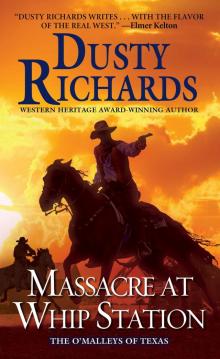 Massacre at Whip Station
Massacre at Whip Station Blue Roan Colt
Blue Roan Colt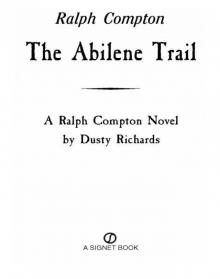 The Abilene Trail
The Abilene Trail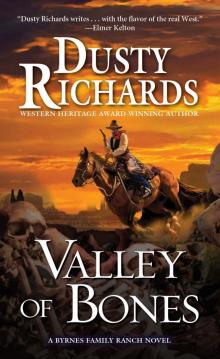 Valley of Bones
Valley of Bones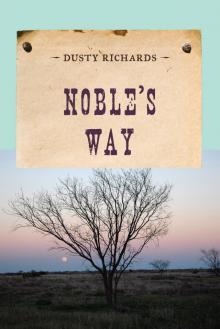 Noble's Way
Noble's Way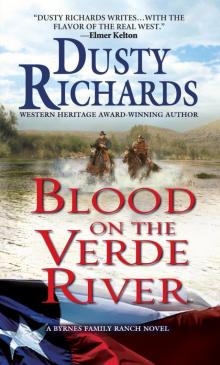 Blood on the Verde River
Blood on the Verde River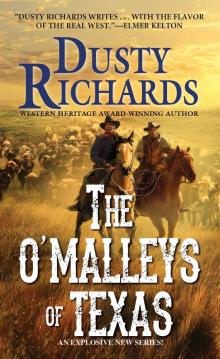 The O'Malleys of Texas
The O'Malleys of Texas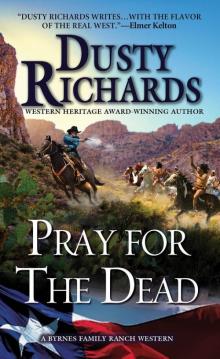 Pray for the Dead
Pray for the Dead Arizona Territory
Arizona Territory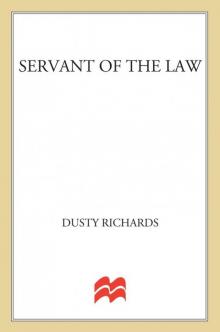 Servant of the Law
Servant of the Law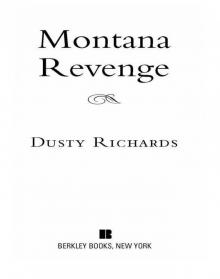 Montana Revenge
Montana Revenge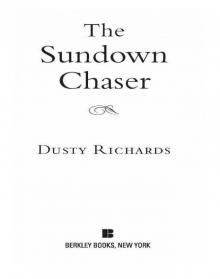 The Sundown Chaser
The Sundown Chaser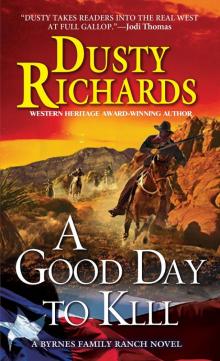 A Good Day To Kill
A Good Day To Kill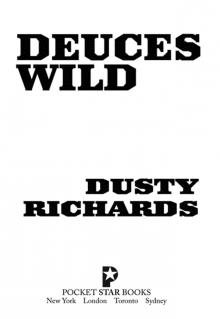 Deuces Wild
Deuces Wild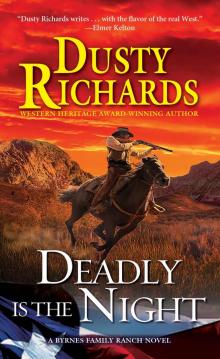 Deadly Is the Night
Deadly Is the Night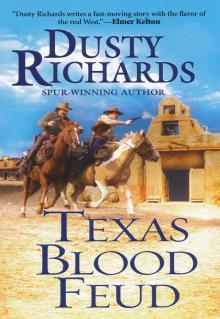 Texas Blood Feud
Texas Blood Feud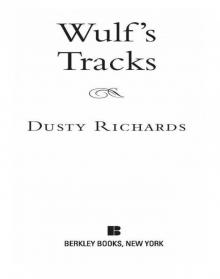 Wulf's Tracks
Wulf's Tracks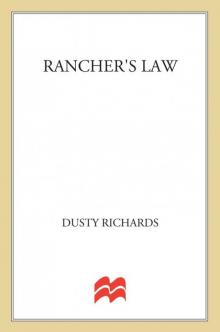 Rancher's Law
Rancher's Law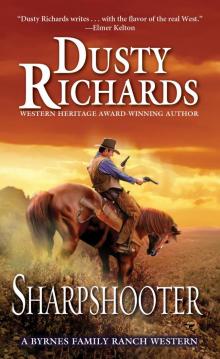 Sharpshooter
Sharpshooter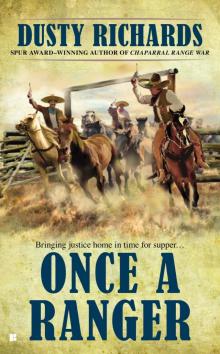 Once a Ranger
Once a Ranger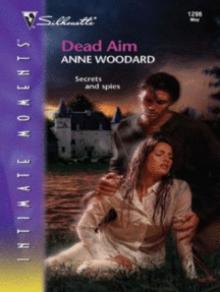 Dead Aim
Dead Aim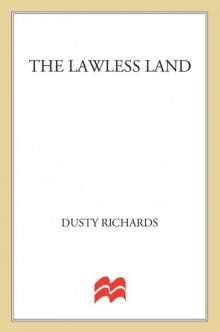 Lawless Land
Lawless Land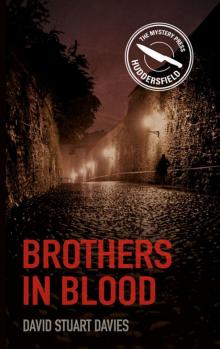 Brothers in Blood
Brothers in Blood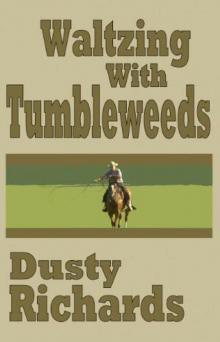 Waltzing With Tumbleweeds
Waltzing With Tumbleweeds